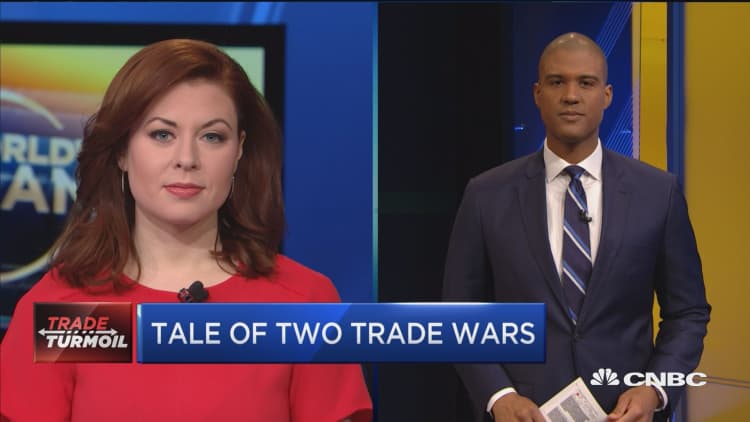If you're looking for trillions of dollars making the bet that a recession is coming sooner rather than later for the U.S. economy, don't look to major corporations.
Not a single chief financial officer from North America on the CNBC Global CFO Council believes there will be a recession this year, according to the first quarter 2019 CNBC CFO survey. While the markets, investors and the Fed have been dealing with a rising level of anxiety about a recession, C-suites are unperturbed. However, they do see economics problems at home and abroad.
For the first time in 11 quarters (since Q2 2016), the CNBC Global CFO Council downgraded its view of the U.S. economy from "improving" to "stable." Meanwhile, China and the United Kingdom were both downgraded from "stable" to "declining."

The CNBC Global CFO Council represents some of the largest public and private companies in the world, collectively managing nearly $5 trillion in market value across a wide variety of sectors. The first quarter 2019 survey was conducted between Feb. 7 and Feb. 22 among 54 members of the Council.
Confidence in the U.S. economy is strong with CFOs across all global regions. No CFO surveyed from the Asia-Pacific region thinks the U.S. will experience a recession either, and only a few CFOs from the Europe, Middle East and Africa region think a recession will occur.
The outlook is more pessimistic for the Euro zone, with less than half of North America-based CFOs willing to say there will not be a recession in Europe. Over one-fifth of CFOs from each of the North America, EMEA and Asia-Pacific regions think there will be a recession in the EU this year.
Chief financial officers remain less convinced about the renewed U.S. stock market rally — and their recent concerns about stock valuations proved to be prescient. In the fourth quarter survey, CFOs told CNBC that it was more likely the Dow Jones Industrial Average declined to 23,000 than rose to 27,000. That survey was conducted shortly before the massive declines in December that saw the Dow touch a low just under 22,000.
In the first quarter survey, more CFOs continue to believe the renewed rally in stocks won't last. They say the Dow is more likely to revisit 22,000 (41 percent) than cross 27,000 (33 percent). Twenty-six percent of CFOs taking the survey said they were unsure about the likely direction in the stock market. The Dow was just under the 26,000 level at the close on Thursday, and stocks finished their second-straight month of positive trading to start the year.
North America-based CFOs also expect the momentum from the 2017 tax cuts to continue to wane. Only 35 percent said the tax cuts will continue to have a positive impact on U.S. companies.

How the CFO view compares to the Fed view
Concerns about a global growth slowdown are weighing on the Federal Reserve. In comments earlier this week at a Federal Reserve Bank of Dallas event, Fed vice chairman Richard Clarida said the global economic slowdown was a big factor behind the central bank's decision to slow its planned interest rate hikes. "The reality is that the global economy is slowing. You've got negative growth in Italy, Germany may just grow ... 1 percent this year, [and] a slowdown in China. These are all things that we need to factor in."
Clarida described the global economy as more "fragile" but said the U.S. economy, "is in a good place right now." He added, "It's a good situation to be in, and we really want to do whatever we can to help support and maintain the economy."
Not a single CFO expects the Fed to cut interest rates in 2019, but only 17 percent think the Fed will raise rates as many as two times. Forty-six percent of CFOs anticipate one rate hike, while 30 percent expect not rate hikes or cuts.
Federal Reserve chairman Jerome Powell said on Tuesday in semiannual testimony before the U.S. Senate, "while we view the current economic conditions as healthy and the economic outlook as favorable, over the past few months we have seen some crosscurrents and conflicting signals. ... financial conditions are now less supportive of growth than they were earlier last year." Powell also expressed concerns about China and Europe. "We will carefully monitor these issues as they evolve," he told senators.
Influential hedge fund billionaire Ray Dalio of Bridgewater Associates lowered his own analysis of recession odds on Thursday, based on the Fed's recent shift to a more patient position. "While I still expect that there will be a significant slowing of growth in the US and most other countries, I have lowered my odds of a US recession coming prior to the US presidential election to about 35 percent," he wrote on Thursday in a blog post on LinkedIn. On Jan. 22, Dalio told CNBC from the World Economic Forum in Davos, Switzerland that he saw a "significant risk" of a recession before 2020.
The Fed conducts its own market research into recession probability and prior to the January 2019 FOMC meeting, the New York Fed asked market participants to rate the chance that the economy was already in a recession and what percent chance they attach to the U.S. economy being in an recession in six months. The median respondent assigned a 2 percent probability to the U.S. currently being in a recession and a 12 percent probability to the U.S. being in a recession in six months, according to a presentation made by New York Fed executive vice president Simon Potter on Feb. 22.
The Fed also asked respondents when they think it is most likely a recession occurs — they placed the highest probability on a U.S. recession first occurring in 2020 or 2021, assigning a roughly 25 percent probability to each, on average. These respondents placed the average change of a recession in 2019 at 17 percent.
Full results of the Q1 CNBC Global CFO Council Survey are below:
(Note: The CNBC Global CFO Council Survey for the fourth quarter was conducted from Feb. 7–Feb. 22, 2019. 54 of the 124 global members responded to the survey (23 North America, 17 EMEA, and 14 APAC).






